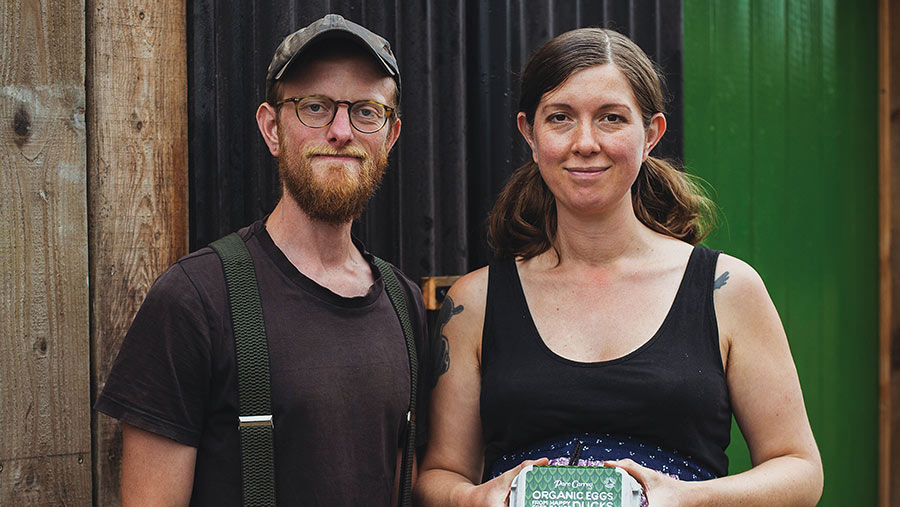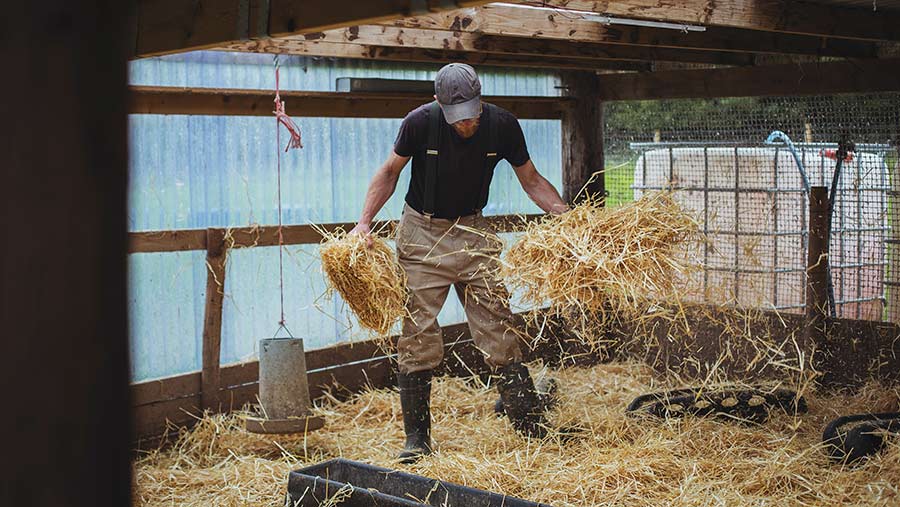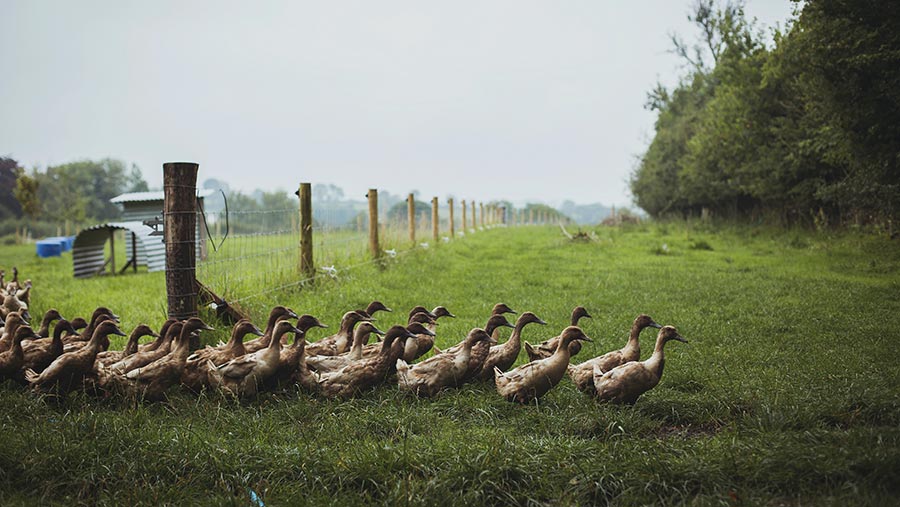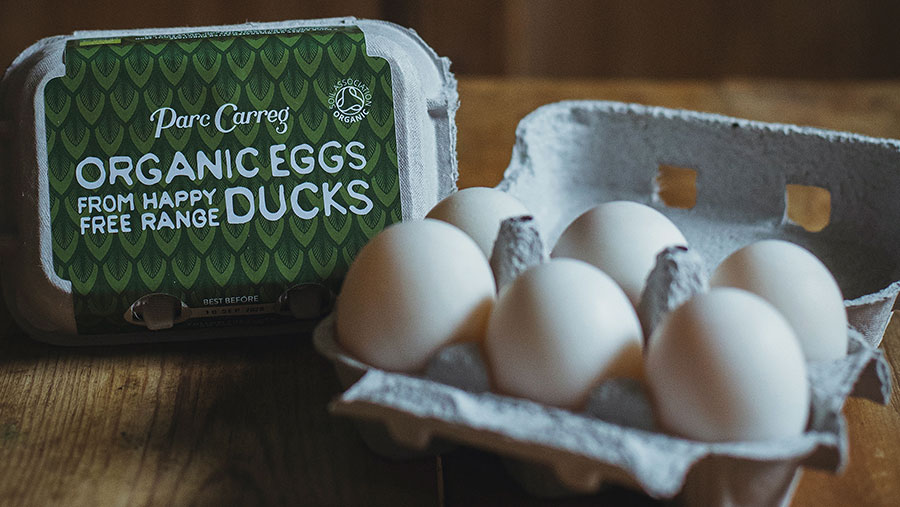How new entrants set up an organic duck egg business
Ditching the city life for the Welsh countryside in 2015, Josh and Abi Heyneke moved to the 4ha Parc Carreg Farm, Carmarthenshire, with the goal of becoming full-time farmers.
But with such a small area, they didn’t know how they would make enough money. “We started producing organic blueberries, then got sheep to take care of the grass, then some ducks,” says Mr Heyneke.
“We quickly realised that we loved the ducks and that no one else was producing organic duck eggs.”
See also: Surviving bird flu: One duck breeder’s story

Josh and Abi Heyneke © Heather Birnie
Farm facts: Parc Carreg Farm, Carmarthenshire
- 4ha
- 500 Khaki Campbell, Dark Campbell and Welsh Harlequin ducks
- 0.4ha of outdoor blueberries
- Small market garden growing veg for a local wholesaler
- 10 breeding ewes comprising Welsh Mules, Blue Faced Leicester cross Welsh Mountain, Shetland, and Blue Texel
The Heynekes’ flock
Now the couple have 500 Khaki Campbell, Dark Campbell and Welsh Harlequin ducks producing 120,000 eggs a year under the Parc Carreg brand.
Mr Heyneke says: “The Welsh Harlequin is a rare breed; the birds are a bit tamer and don’t lay quite as well because they haven’t been used as a working breed.
“We want to bring them back to more of a working bird, like the Khaki Campbell.”
All breeding and hatching takes place on the farm. “We select birds for health, productivity and ability to do well in our system,” he says.
Ducks are kept until they are about two years old, then sold on to a buyer who takes them to market, where they are usually sold to smallholders.
“Originally we had aspirations to keep our ducks for longer, but we realised after a certain age the duck eggs become more variable in quality, break easily and become too large,” Mr Heyneke says.
He breeds 250 new ducks a year and replaces half the flock. “We have 500 at any given time; half of them are point-of-lay and half are older.”
Having the mix of ages works well. “They can be quite skittish to start with, and they like routine,” says Mr Heyneke. “They like to see the same person, in the same clothes, feeding the same thing at the same time of day, or they can become quite stressed.
“So when the new ducklings come out, we can introduce them to the older birds who already know the routine.”
Regenerative practices

© Heather Birnie
The couple are passionate about regenerative agriculture. “There’s not a lot of information about regenerative management of ducks, so we have found a system that works for us,” says Mr Heyneke.
“Generally, ducks are kept on concrete but that doesn’t classify as organic – which might be part of the reason why there are so few organic producers. We use straw instead.
“Ducks are very messy – they produce more manure per kilogram of bodyweight than any other livestock. Part of that is because they consume a lot of water, so the manure is quite wet.
“The quantity of straw we get through is immense. If you don’t use a lot of straw, the eggs get messy and you have more cleaning to do.”
So what does he do with all the manure? “The straw is a big input but it’s an incredible resource – it’s amazingly rich, fertile compost.” That finds a use on the couple’s market garden and vegetable patches.
Grazing and feed strategy

© Heather Bernie
“Other regenerative poultry farmers rotate houses round the fields, but because we’re building up tonnes of manure, we can’t have a mobile house,” says Mr Heyneke.
Instead, the farm has static housing. Every morning the ducks are taken to a field where they stay for the day. In the evening they meet the couple at the gate and are returned to the housing.
One difference between chickens and ducks is that ducks can be herded. This herding behaviour enables the Heynekes to rotate the ducks around the farm without needing mobile housing or machinery – a bonus in the wet Welsh countryside.
The ducks are fed an organic layer pellet – and prices are on the rise. “It’s tough for a lot of producers and the high prices are hitting us too,” Mr Heyneke says.
“The way I see it, we get eggs and high-quality manure on the fields. Essentially, we’re paying for our feed, fertiliser and compost all in one.”
And the grass grows well. “I put this down to a combination of the ducks fertilising the pasture as well as rotationally grazing our sheep.”
The ducks follow 10 sheep in the grazing rotation. “The grass gets the appropriate resting period, which allows it to come back well,” says Mr Heyneke.
Pest management
The ducks also play a role in pest management, controlling slugs and voles, the latter of which are a real threat to the blueberry bushes. “Ducks won’t eat a fully grown vole but will eat a nest of baby voles,” he says.
The blueberry patch provides the ducks with a good habitat, including shade and shelter.
Mr Heyneke is careful not to romanticise the system, however. “We need to be careful the ducks don’t eat the vegetables; we use them where they can keep the slugs under control around the edges of the veg patches without actually entering them.”
Marketing the eggs

© Heather Birnie
The couple primarily sell their eggs to Abel & Cole, although some go to local organic wholesalers – with an average gross margin of 30%.
“I think eggs in this country are massively underpriced, compared to other European countries,” says Mr Heyneke.
“Because we have a niche product and there’s basically no competition, we’re able to charge a premium; it makes it more feasible.”

